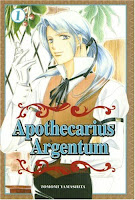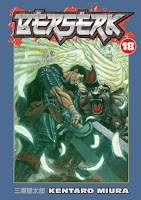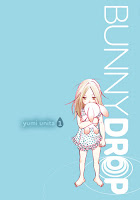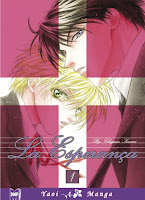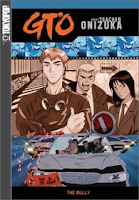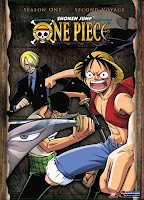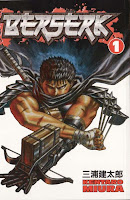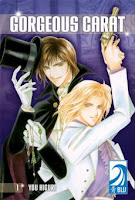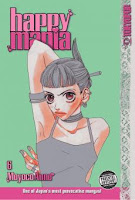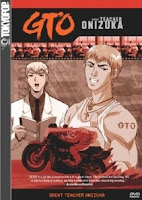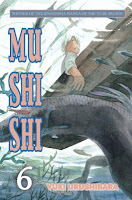My News and Reviews
This past week was the February 2011 Manga Moveable Feast, hosted by Sam Kusek over at A Life in Panels. It was a great feast featuring Keiji Nakazawa’s Barefoot Gen; even Last Gasp, the publishers for the series in English, participated. I had three related posts, including reviews of Nakazawa’s autobiography Hiroshima: The Autobiography of Barefoot Gen and my first in-depth manga review for February for Barefoot Gen: A Cartoon Story of Hiroshima.
I really need to updated the Resources page—I’ve a bunch of new sites to add—so I’ll try to get around to that this week. Also coming up this week: Wednesday will start my monthly manga giveaway. I haven’t quite decided which manga it will be yet, so you’ll just have to drop by on Wednesday to find out. I’m also excited for Wednesday to roll around since Kodo will be in town for a performance, and I have tickets!
Quick Takes
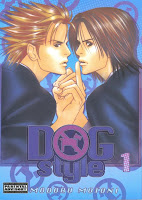 Dog Style, Volumes 1-3 by Modoru Motoni. The first volume of Dog Style is a bit sporadic and difficult to follow at times, but by the end of the third volume Motoni had completely won me over. As the series progresses, both Motoni’s art (which was pretty good to begin with) and writing improves greatly. The story gets a bit angsty at times, and it’s not exactly romantic, but I enjoyed seeing Teru and Miki’s relationship develop. Teru and his friends are delinquents, so he tends to get involved in violent fights, and Miki has his own problems and past to deal with. The two start out as strangers but come to rely on each other; complete with some killer kisses and more. (Also, bonus points for use of condoms.)
Dog Style, Volumes 1-3 by Modoru Motoni. The first volume of Dog Style is a bit sporadic and difficult to follow at times, but by the end of the third volume Motoni had completely won me over. As the series progresses, both Motoni’s art (which was pretty good to begin with) and writing improves greatly. The story gets a bit angsty at times, and it’s not exactly romantic, but I enjoyed seeing Teru and Miki’s relationship develop. Teru and his friends are delinquents, so he tends to get involved in violent fights, and Miki has his own problems and past to deal with. The two start out as strangers but come to rely on each other; complete with some killer kisses and more. (Also, bonus points for use of condoms.)
 Japan written by Buronson and illustrated by Kentaro Miura. The primary reason I picked up Japan was that Berserk‘s creator, Kentaro Miura, worked on it. Also, the setting interested me since post-apocalyptic fiction is one of my favorite sub-genres. There were some nice story elements in Japan that could have made a great short series. Unfortunately, in this one-shot they’re overshadowed by the constant and unnecessary, semi-political commentary on what it really means to be “Japanese.” I think Miura’s art works best in the post-apocalyptic setting; I wasn’t quite as convinced by his modern environments.
Japan written by Buronson and illustrated by Kentaro Miura. The primary reason I picked up Japan was that Berserk‘s creator, Kentaro Miura, worked on it. Also, the setting interested me since post-apocalyptic fiction is one of my favorite sub-genres. There were some nice story elements in Japan that could have made a great short series. Unfortunately, in this one-shot they’re overshadowed by the constant and unnecessary, semi-political commentary on what it really means to be “Japanese.” I think Miura’s art works best in the post-apocalyptic setting; I wasn’t quite as convinced by his modern environments.
 K-ON!, Volume 1 by Kakifly. This may just be the best yonkoma manga that I’ve read so far. I laughed so much. Granted, as a musician, I felt a particular fondness for the girls in the pop music club as they try to put together their own band. I found Yui, the accidental guitarist, particularly amusing since she doesn’t know a thing about music but she’s still very enthusiastic about the whole thing. Actually, I like all of the characters that have been introduced up to this point. K-ON! makes me very happy and I can easily see why this series is so popular. I’ll definitely be reading future volumes as they are released in English.
K-ON!, Volume 1 by Kakifly. This may just be the best yonkoma manga that I’ve read so far. I laughed so much. Granted, as a musician, I felt a particular fondness for the girls in the pop music club as they try to put together their own band. I found Yui, the accidental guitarist, particularly amusing since she doesn’t know a thing about music but she’s still very enthusiastic about the whole thing. Actually, I like all of the characters that have been introduced up to this point. K-ON! makes me very happy and I can easily see why this series is so popular. I’ll definitely be reading future volumes as they are released in English.
 Chi’s Sweet Home: Chi’s New Address, Episodes 1-52 directed by Mitsuyuki Masuhara. Chi’s New Address is the second Chi’s Sweet Home anime. I’ve never seen the first, but I have been reading and loving the original manga series. And I’m loving the anime, too. The season is 104 episodes long, but each episode is under three minutes long. At first, the baby noises that Chi makes annoyed me, but I soon got over it. The anime is every bit as cute and adorable as the manga. The animation is simply delightful and almost every episode made me laugh. And it didn’t matter how many times I watched the opening—I giggled every single time.
Chi’s Sweet Home: Chi’s New Address, Episodes 1-52 directed by Mitsuyuki Masuhara. Chi’s New Address is the second Chi’s Sweet Home anime. I’ve never seen the first, but I have been reading and loving the original manga series. And I’m loving the anime, too. The season is 104 episodes long, but each episode is under three minutes long. At first, the baby noises that Chi makes annoyed me, but I soon got over it. The anime is every bit as cute and adorable as the manga. The animation is simply delightful and almost every episode made me laugh. And it didn’t matter how many times I watched the opening—I giggled every single time.
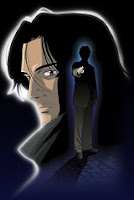 Monster, Episodes 40-60 directed by Masayuki Kojima. While I’m still enjoying the anime adaptation of Monster, I think I can safely say at this point that I prefer the manga. The slow, deliberate plot development that worked so well in the original comes across as tedious and ponderous in the anime. It’s a problem of the anime trying too faithfully to recreate the manga. It probably would make a better series if the story was trimmed and focused a bit more. However, it’s not all bad. Grimmer, probably my favorite character in the entire series, makes his first appearance in these episodes. And Nina and Johan’s backstory, the truth behind everything that is going on, begins to be revealed.
Monster, Episodes 40-60 directed by Masayuki Kojima. While I’m still enjoying the anime adaptation of Monster, I think I can safely say at this point that I prefer the manga. The slow, deliberate plot development that worked so well in the original comes across as tedious and ponderous in the anime. It’s a problem of the anime trying too faithfully to recreate the manga. It probably would make a better series if the story was trimmed and focused a bit more. However, it’s not all bad. Grimmer, probably my favorite character in the entire series, makes his first appearance in these episodes. And Nina and Johan’s backstory, the truth behind everything that is going on, begins to be revealed.

